
Wildlife in a Changing Climate

On November 13, 2019, at FODM’s quarterly meeting, Dr. Sally Valdes outlined several ways that climate change is adversely affecting wildlife. Introducing the topic, she said that carbon dioxide and other greenhouse gas emissions have risen to levels unprecedented in the last 800,000 years. Carbon dioxide concentrations have been tracked continuously at the Mauna Loa Observatory in Hawaii since 1958 and the trend has been steadily upward, from about 315 parts per million (ppm) to 414 ppm in the spring of 2019.
Enhancing the Native Plant Project
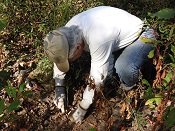
On October 11, 2019, FODM volunteers and National Park Service staff put in 400 more native plants in the native plant restoration area in Dyke Marsh, a .65-acre plot on the west side of the Haul Road trail. The group planted riverbank wild rye (Elymus riparius), New York ironweed (Vernonia noveboracensis), wild rice (Zizania aquatica) and deer tongue (Dichanthelium clandestinum (syn. Panicum clandestinum)).
FODMer Saves Bats

FODM Board of Directors’ member Deborah Klein Hammer saves bats and is featured in a September 16, 2019, article in “DCist” here.
Deborah studies Brazilian freetail (Tadarida brasiliensis) and Seminole bats (Lasiurus seminolus) in Dyke Marsh. Around 2013, a Brazilian free-tailed bat came into care of the Save Lucy Campaign (www.savelucythebat.org/), an organization devoted to rehabilitating injured and orphaned bats and educating the public about the importance of bats.
Dyke Marsh Turns a Brilliant Yellow
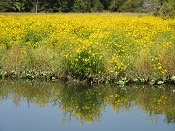
In the late summer and early fall, parts of Dyke Marsh turn a brilliant yellow. The yellow blossoms are typically plants in the family Asteraceae.
Many of the plants are Bidens laevis, common name, beggar-ticks, says botanist Dr. Elizabeth Wells, and she explains that they are restricted to low, wet places such as marshes. The name Bidens refers to the two teeth on each achene (Bidens = two (bi) teeth).
The Songs of Insects

Fall brings a “special orchestra” to the out-of-doors, began Wil Hershberger, at the September 11, 2019, meeting of the Friends of Dyke Marsh, at which Hershberger explored the songs and singing of crickets, katydids, grasshoppers (Orthoptera) and cicadas. In late summer and early fall, these singing insects fill the air with their courtship choruses.
Cardinal Flower, A Late Summer Burst of Red
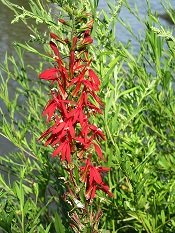
The brilliantly crimson cardinal flower (Lobelia cardinalis) brightens the marsh in late summer and early fall. A perennial, it typically stands erect, rising from a tangle of green foliage and commands attention because of its scarlet hues. It can be from one to six feet tall.
Wild Rice Provides a Fall Feast
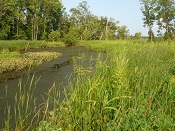
In late summer and early fall, Dyke Marsh’s wild rice (Zizania aquatica) is a shimmering panorama of green in the breeze. It is a native, annual, emergent, light green grass with flower clusters on broom-like branches. Wild rice thrives in soft, muddy areas and can grow to eight to 10 feet tall.
FODMers Study Summer Plants
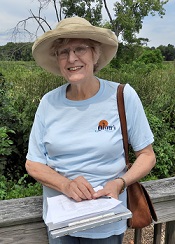
On August 10, 2019, Dr. Elizabeth Wells, botanist, led a plant walk in Dyke Marsh. The 20 attendees learned about many native insects and plants during the three-hour walk along the Haul Road trail and out to the end of the boardwalk.
Storm Felled Iconic Tree
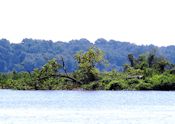
On July 17, 2019, during an early evening storm, the beautiful Eastern cottonwood tree on Dyke Island, came down. “This tree was one of the most loved bald eagle perches in the George Washington Memorial Parkway park,” said Brent Steury, National Park Service Natural Resources Program manager for the Parkway. FODMers have also seen peregrine falcons, Baltimore orioles and other birds using the tree to rest and nest.
Pileated Woodpeckers Are Active in Dyke Marsh

In June 2019, FODMers observed pileated woodpeckers in Dyke Marsh feeding young, corroboration of successful nesting, and observers saw a male pileated feeding grubs to a fledgling male that appeared larger than his parent. After that, the young pileated moved and surveyed a branch in a cottonwood tree that had an abundance of carpenter ants. He feasted on his prey, using his long sticky tongue to access them.
Turk's Cap Lilies Brighten the Wetland
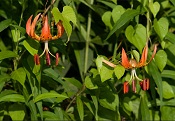
On July 2, 2019, FODMer Ed Eder photographed Turk’s cap lilies (Lilium superbum) while canoeing in the southern big gut of Dyke Marsh. Ed commented that a few clusters remain, having “survived despite profound erosion. How long they will hang on is difficult to ascertain, but the Lilium superbum is a gem in any wetland and difficult to locate at all in Fairfax County.”
Sea Level Rise Will Affect Dyke Marsh
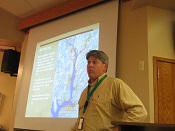
The rate of relative sea level rise along the tidal Potomac River is around 3.33 millimeters a year according to long-term water level data collected by the National Oceanic and Atmospheric Administration (NOAA), reported Geoffrey Sanders on May 15, 2019, to 65 people who attended FODM’s quarterly meeting. Sanders is the Network Program Manager for the National Park Service’s National Capital Region Inventory and Monitoring Network.


AlbertHerring-b4cc6b5cfb.jpg)



 Friends of Dyke Marsh, Inc. is a non-profit 501(c)(3) organization.
Friends of Dyke Marsh, Inc. is a non-profit 501(c)(3) organization.